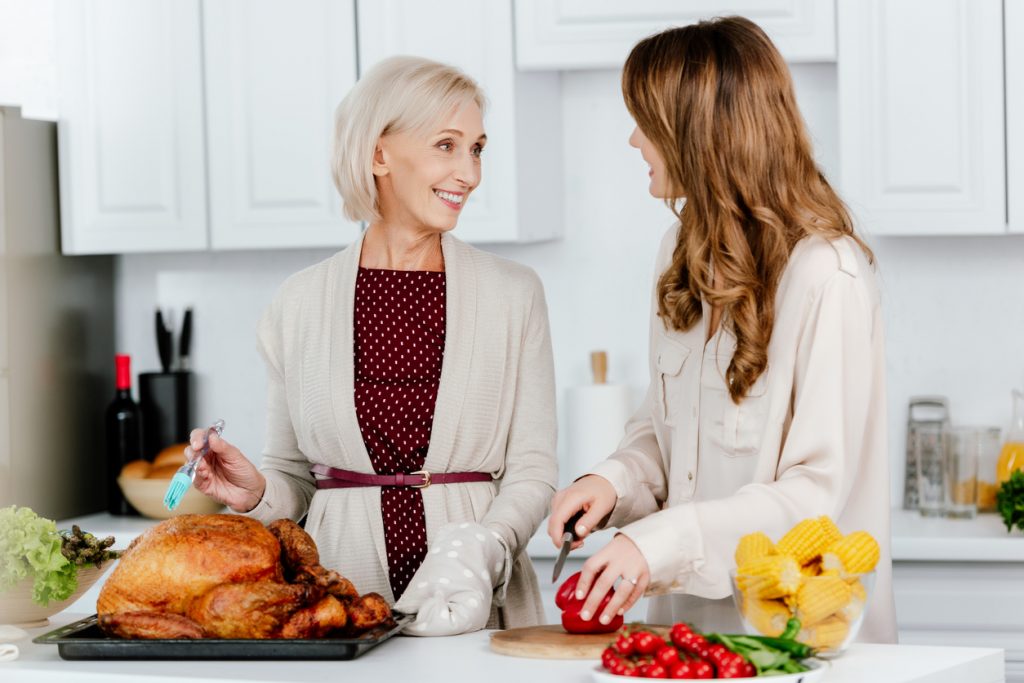When you think of the holidays, what’s one of the first things that comes to mind? Food, right?
All the dishes, casseroles, dips, and sweets — there is just so much to choose from that it makes it hard to stop. For some, this may be an enjoyable thing. For others, the holidays can bring major food and eating anxiety, and sometimes it can exacerbate existing anxiety around food in the form of eating disorders.
I wanted to talk to about this because it’s not commonly a topic of discussion. Yet it is a common issue, with at least 30 million people (estimated 20 million women and 10 million men) of all ages dealing with an eating disorder in the US. You or someone you know could be one of them, so let’s educate ourselves on the most common eating disorders and consider how the holidays might affect those who have them.
Binge Eating Disorder
Binge eating disorder is when a person feels a loss of control and increased distress over their eating. Unlike Bulimia Nervosa, binge eating disorder doesn’t involve purging, excessive exercise, or fasting afterward. This is why the holidays can be a challenging time for someone with binge eating disorder, as overeating is often encouraged, praised and even pressured.
>READ: WHAT FACTORS DRIVE WOMEN TO BINGE EATING AT NIGHT?
Bulimia Nervosa
Bulimia Nervosa is characterized by the same feeling of loss of control, followed by eating large amounts in a short amount of time. What follows is a behavior that compensates for the binge, whether it’s fasting, excessive exercise, or purging in some form. This condition can be made worse in response to insensitive comments, such as, “wow! You’ve gained weight!” or “look, you finally got some meat on your bones!” Those are just a few trigger words and phrases. Be aware of how you’re commenting on others’ appearances this season.
Anorexia Nervosa
Anorexia Nervosa is known for the major reduction in food intake, leading to extremely low body weight. It’s also characterized by a “relentless pursuit of thinness; a distortion of body image and intense fear of gaining weight.” This condition has similar triggers as Bulimia Nervosa, in that it can take an appearance-related comment to incite shame or the strong reluctance to eat.
Eating Disorders and the Brain
The brain is very active in eating disorders, and starvation and purging can impact the levels of proteins in the blood. This can directly alter the neural circuits related to the perception of oneself and others, creating a cycle that promotes the illness.
There are three major parts of the brain involved in eating disorders. The insula processes feelings of hunger and other sensations, such as taste, flavor and texture. It’s more sensitive than normal in bulimia and less so in anorexia. The anterior cingulate cortex is involved in decision making and anticipation of reward. It’s less active in response to food in anorexia and more active in response to food in bulimia. Lastly, the dorsolateral prefrontal cortex regulates self-control and is more active in anticipation of food in anorexia and less active in anticipation of food in binge eating disorder.
>READ: IS THERE A MAGIC POTION FOR A HEALTHY BRAIN?
Eating — or Not Eating — is Emotional

A lot of emotion is involved with eating disorders, such as feelings of guilt, regret, low self-esteem and fear. There can be guilt and regret over eating too much — perhaps to satisfy some emotional need. Eating nothing or purging to sustain some kind of control over one’s life and body is a form of emotional eating. Or low self-esteem about one’s weight and appearance. And fear that you will become stuck in these cycles (in turn, it feels once again like it’s out of your control).
Fork That Eating Disorder
This time of year we immerse ourselves in family and food. We subject ourselves to stressful holiday schedules and socializing. It’s no wonder those dealing with eating disorders may experience heightened susceptibility to their symptoms. Here are 4 ways to help protect yourself during the holidays, but also for you to be aware of how you approach others about eating this holiday season.
-
Lean on your support system.
If you have a group of friends and family who understand what you’re going through, seek help and support from them. It’s so important for those you’ll be spending holiday time with to remember that mealtimes and other food situations are stressful for you. If you have a friend or family member dealing with it, remain calm, loving and supportive during these times.
-
Prepare some responses.
For those who aren’t as supportive, it always helps to come up with go-to responses to counteract their pressures or insensitive comments. In some ways, this response could even benefit you therapeutically. For example, you could say, “today I’m not thinking about food and how it affects my body.”.
-
Set a holiday eating plan.
Planning ahead makes one feel secure, in control and less fearful. Think about the dishes that will be present at various events. Are there some events of which you may need to avoid? Think ahead about appropriate portions for yourself, and use those boundaries for how you approach the meal. Perhaps you need to eat something before heading out to the party or bring small healthy snacks along with you.
-
Don’t completely cut out things you like.
The holidays are for enjoying certain foods. Sometimes, completely depriving yourself of something you enjoy can have the opposite effect. Later, it may be easier to binge eat when you deprived yourself of the modest treat earlier in the day.
You Are In Control

In the end, you do have control, even if it’s hard to see. Try to remember that this holiday season, and if you have a “slip,” also try to remember that you’re human. Guilt and shaming yourself accomplishes nothing. Be kind to yourself, and happy holidays.
>READ: WHAT DO THE HOLIDAYS HAVE TO DO WITH THE LONELINESS EPIDEMIC?







